Travel Detective & Middle Seat Columnist Talk Upgrades, Downgrades, Passenger Rights
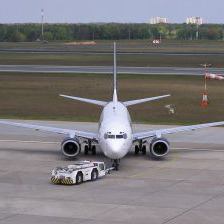 This weekend on Peter Greenberg Worldwide Radio, your very own Travel Detective sat down with Middle Seat columnist Scott McCartney of the Wall Street Journal to discuss the latest in air travel.
This weekend on Peter Greenberg Worldwide Radio, your very own Travel Detective sat down with Middle Seat columnist Scott McCartney of the Wall Street Journal to discuss the latest in air travel.
Buckle up for a bumpy ride as these two travel veterans get down to the nitty-gritty of upgrades, air passengers’ rights and the state of the airline industry.
Peter Greenberg: You have been a busy guy lately in the Wall Street Journal, with lots of stories about people getting bumped and how to get an upgrade. There’s more bumping than ever right now, right?
Scott McCartney: Yes, there’s more bumping than ever. It’s really quite traumatic. The numbers are up 40 percent and probably going higher.
PG: As the capacity shrinks, the airlines haven’t changed their overbooking policies, so the number’s going to go even higher, right?
Get more of the latest air travel news in our Airlines & Airports section.
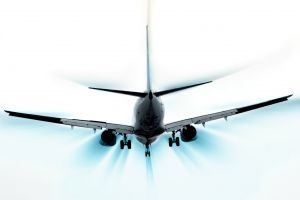 SM: That’s right. It’s the capacity shrinking, planes are full. Continental just said that it’s load factor in September (which is usually a slow travel month), they filled 82 percent of their seats. That was up 5 percentage points over last year. It’s historic. There are a couple other things that happened. One is, travelers have smartened up and said, “I’m not going to take your voucher, because your silly voucher is difficult to use. It’s only good on certain fares or there are blackout dates, and things like that. Go ahead and bump me and pay me cash,” which they are entitled to do. And with the increase in leisure travelers on airplanes and fewer business travelers on airplanes, people don’t “no-show” like they used to. Those with refundable tickets on vacation actually show up, and that has really changed the bumping dynamic for airlines.
SM: That’s right. It’s the capacity shrinking, planes are full. Continental just said that it’s load factor in September (which is usually a slow travel month), they filled 82 percent of their seats. That was up 5 percentage points over last year. It’s historic. There are a couple other things that happened. One is, travelers have smartened up and said, “I’m not going to take your voucher, because your silly voucher is difficult to use. It’s only good on certain fares or there are blackout dates, and things like that. Go ahead and bump me and pay me cash,” which they are entitled to do. And with the increase in leisure travelers on airplanes and fewer business travelers on airplanes, people don’t “no-show” like they used to. Those with refundable tickets on vacation actually show up, and that has really changed the bumping dynamic for airlines.
PG: That has also changed the upgrade dynamic, hasn’t it?
Check out some Strategies for Scoring Airline Upgrades.
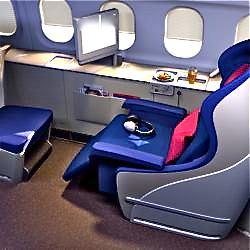 SM: It has changed the upgrade dynamic. I think there are more opportunities, but there are fewer people buying seats up front. But, what we hear anecdotally is airlines have been stingy about selling seats in first and business classes—maybe more than you would expect in a downturn where they are really struggling for business travelers. So airplanes are flying with empty business-class seats across the Atlantic while premium-level frequent fliers sit the first couple rows of coach and just fume.
SM: It has changed the upgrade dynamic. I think there are more opportunities, but there are fewer people buying seats up front. But, what we hear anecdotally is airlines have been stingy about selling seats in first and business classes—maybe more than you would expect in a downturn where they are really struggling for business travelers. So airplanes are flying with empty business-class seats across the Atlantic while premium-level frequent fliers sit the first couple rows of coach and just fume.
PG: Last week I was in Europe going from Paris to Milan on a very interesting airline called Lufthansa Italia. It’s sort of a joint operation between Lufthansa and Alitalia, on an Airbus. I was up in business class because there is no first-class configuration over there, and I was the only passenger in business class.
Check out another way to get an upgrade: Upgrade Certificates: Buying Your Way Into First-Class.
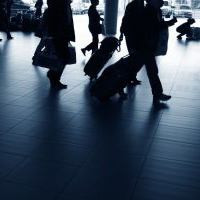 SM: Yeah, it’s really quite remarkable. You would think they would be more generous. I think the real dynamic here is they’re really trying to sell upgrades any way they can. They’ve made it more complex; they’ve added co-payments. It’s more expensive these days to upgrade, but I do think if you’re willing to pay, there are more opportunities. And the other thing to remember is that business-class tickets have been discounted so much. Sometimes you can get a really good deal just straight-out buying a business-class ticket.
SM: Yeah, it’s really quite remarkable. You would think they would be more generous. I think the real dynamic here is they’re really trying to sell upgrades any way they can. They’ve made it more complex; they’ve added co-payments. It’s more expensive these days to upgrade, but I do think if you’re willing to pay, there are more opportunities. And the other thing to remember is that business-class tickets have been discounted so much. Sometimes you can get a really good deal just straight-out buying a business-class ticket.
PG: You realize what you just said, Scott? It was sort of like describing a bordello: If you’re willing to pay, there are more opportunities.
SM: Well, I think that says a lot about the airline business, doesn’t it?
PG: I was so glad you said that. Hey, another question I’ve got for you, because this week on The Early Show, I’m doing a piece on where we stand in terms of passenger rights. As you know, there’s at least one piece of legislation on the floor introduced by Senators Boxer and Snowe about passenger rights. Call me nutty, but when I read the language of that bill, it doesn’t seem particularly strong.
Check out Peter’s Early Show piece on passenger rights here.
SM: No, I don’t think it is particularly strong. Airlines have fought this tooth and nail. There was an interesting little episode when the airlines were talking to a senior Department of Transportation official and said, “Maybe we can live with this.” The official felt like he needed to put that on public record and he put that on the Federal Register. The airlines were not happy about that.
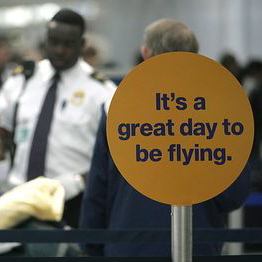 PG: The most interesting development for me was that the former chairman of American Airlines, Robert Crandall, is now in favor of legislation.
PG: The most interesting development for me was that the former chairman of American Airlines, Robert Crandall, is now in favor of legislation.
SM: Yes, I think he is. Bob Crandall is legendary in this business; a really smart guy. He’s always been one who thought that government had a role, and he’s a passenger now that he’s retired. I think he thinks it’s ridiculous to be holding people on airplanes for five or six hours, and so government ought to do something about it.
PG: But now let me set the scene, and this has happened to me on every delayed plane I’ve been on, and I suspect to you as well: Unless it’s a mechanical problem, no airline every says, “We’re going to be on the ground for seven hours.” It’s always, “We’re going to be delayed 30 minutes.” And then it’s another 30 minutes, and another 30 minutes. Let me read you the language of the prospective bill. For example, if you’re on the ground for at least three hours, then the pilot can return to the gate if he thinks it’s reasonable and safe to do so. That’s fine, but the question is, who’s telling him it’s reasonable and safe? Is it the airline or the weatherman? Then that whole requirement is waived if the captain reasonably expects to take off within 30 minutes. Well, every delay is always 30 minutes!
Learn more about the latest efforts in Congress with FAA Reauthorization Bill Includes Passenger Rights, Air Traffic Control Modernization
 SM: It does give the captain a lot of leeway and that’s an issue. I’m not sure there’s any other way to get it passed. And there is the aspect that you’ve got to let the captain make the decision in the situation—I don’t think we want to legislate any other way. But you’re right, it’s pretty soft.
SM: It does give the captain a lot of leeway and that’s an issue. I’m not sure there’s any other way to get it passed. And there is the aspect that you’ve got to let the captain make the decision in the situation—I don’t think we want to legislate any other way. But you’re right, it’s pretty soft.
PG: I’ve got an idea that will solve everything. Combine the passenger bill of rights with health care. If the plane is delayed more than three hours, the plane taxis directly to an HMO you don’t want to go to. What do you think?
SM: I think that’s good. Just introduce some co-pays and government accounting.
PG: Hey, the airlines know all about co-pays already. Now last but not least, does the Clear Registered Traveler program have any chance in coming back?
Learn more: Clear Pass Airport Lanes Shut Down Amid Financial Woes.
SM: I really don’t think so, but there are folks who are trying. There’s a private equity group that’s trying to buy the assets of the Clear program from the debtors. They have a letter of intent, they’re going to get some money and give it a shot. The Flo Corporation is trying to revive a nationwide registered traveler program. But the hangup is the same hangup it’s been all along: the TSA. Until we know where the new TSA chief will stand on this, I don’t think it’s going anywhere. I suspect when he gets into office this is something he’s going to study for a long time before making a decision.
From Peter Greenberg Worldwide Radio.
You can listen to this segment online here.
Related links:
- Latest Tarmac Delays Add Fuel to Debate Over Air Passengers’ Rights
- FAA Reauthorization Bill Includes Passenger Rights, Air Traffic Control Modernization
- Express Jet Tarmac Prompts Renewed Calls for Passenger Bill of Rights
- Peter’s Early Show piece on passenger rights
- Airlines & Airports section
- Clear Pass Airport Lanes Shut Down Amid Financial Woes












